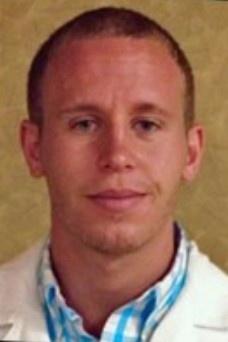
As a college student, Jake Gardner, PA-C, knew he wanted to study the human brain but wasn’t sure what specific career path to take. He studied to be a physician assistant, which cemented his love of working with patients with psychiatric and neurological disabilities in particular. Now, he’s our newest addition to our APP residency program. In this week’s “Spotlight” interview, Gardner talks to us about the joys of connecting with vulnerable patients, his plans for the future, and loving James Bond and 1980s heavy metal when he’s not at Duke.
What are your current responsibilities as an APP resident? What does a typical day look like for you?
I am so fortunate to have been accepted into this program. My job each day is to show up and learn from these amazing providers on the neurology team. Right now I spend the majority of the day observing one of the neuro providers in the exam room with the patient. They will often ask me to participate or ask my input on something. As the program progresses, I will be seeing patients on my own and getting a good history and a few differential diagnoses before my supervising provider comes into the room. We then discuss the case afterwards and I take the feedback given to me to improve.
How and when did you first become interested in treating patients with psychiatric and neurological disabilities?
In college I decided my career was going to involve the brain, some way somehow, but I was not sure whether that would be through medical school, PA school, physical therapy, teaching, or a PhD for research or to be a psychologist. So, my passion for the brain came before I decided on medicine, but once I picked medicine, one sort of followed the other, and this patient population became very special to me.
What do you enjoy most about working with this population?
I think psychiatric and neurological disorders, especially neurologic disorders localized to the brain, can be some of the scariest pathologies for patients because they affect the deepest part of who a person is; they can affect how we think and feel and oftentimes patients can feel helpless. I won’t go into detail, but I will say that I can relate to this population very well and I think that helps me connect with them on a deeper level. Because these pathologies can be so scary, I find that patients are often extremely grateful and relieved through education and treatment. I enjoy being the one to help them feel that way.
In addition to your PA degree you also have a master’s degree in neurophysiology. How does that experience and knowledge complement your work as a physician assistant?
The most important thing I took from that program was skepticism and the importance of how to properly research a subject. This pandemic, and the relentless spread of false medical information, has shown the world that these skills are incredibly lacking. All is well and good until false information starts hurting people, then we have a problem. Besides those aspects I mentioned, the degree helped me hammer down neuroanatomy and physiology, which we do NOT get much of in PA school at all. Neurology Is very much like a puzzle, and the best way to fix something is to first understand how it works. I find this to be very important in medicine overall but especially neurology.
What plans do you have for after you complete your residency? If you could have any job in the world, what would it be?
My dream job would be a subspecialty of neurology called behavioral neurology, also known as neuropsychiatry, where the worlds of psychiatry and neurology intersect. If there is an opportunity for me here at Duke once I finish this fellowship, I plan to take advantage of that. I am very grateful to be here with Dr. Morgenlander and the rest of the neurology team.
What other passions or hobbies do you have outside of the Department?
Reading philosophy is a hobby of mine. I enjoy video games. They are great fun in and of themselves, but they also let me play online with my best friends who I don’t get to see very often. Hearing them in a headset is almost as good as having them sitting next to you. I also love 80s music, especially 80s metal, and I play my guitar every day. It is relaxing but also energizing. I enjoy exploring science museums or finding a new hiking trail. I also love movies. Some of my favorites are Gladiator and the Daniel Craig Bond films.

In this photo Gardner sits in a plane of a psychiatrist he worked for six months as they take a private flight to a drug talk.